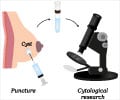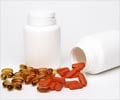A new study from Georgetown University Medical Centre has found that vitamin A can push breast cancer cells to form blood vessel, thus promoting tumour growth in patients.
A new study from Georgetown University Medical Centre has found that vitamin A can push breast cancer cells to form blood vessel, thus promoting tumour growth in patients.
The researchers found that vitamin A, when applied to breast cancer cells, triggers genes that can push stem cells embedded in a tumour to morph into endothelial cells.These cells can then build blood vessels to link up to the body's blood supply, promoting further tumour growth.
They showed that in cancer cells, vitamin A seems to turn on cancer stem cells, allowing them to form the blood vessel tissue, needed most as tumours develop.
The team said that the new find is a proof of principle of the new vasculogenic mimicry theory, proposing that, as needed, tumours build their own blood pipelines.
This is very different from the well-known role of tumour angiogenesis, when tumours send signals to blood vessels to grow toward the cancer.
"Finding that vitamin A may cause some breast cancer cells to form blood vessels brings up the rather disturbing notion that treatment with these drugs may actually stimulate tumour growth," said study's senior author, Stephen W. Byers, Ph.D., a professor of oncology and cell biology at Georgetown's Lombardi Comprehensive Cancer Centre.
Advertisement
"What led us to this study is that previous research on retinoids implied that they may be effective in a preventative setting, but may actually have a negative effect after tumour initiation and during progression," he added.
Advertisement
When they mixed the treated cancer cells with endothelial cells taken from human umbilical cord blood, structures similar to blood vessels developed within the tumour masses grown in culture.
"What this study tells us is that treating stem cells that have retained the ability to become cell types other than breast with differentiating agents such as vitamin A may cause an inappropriate cell to develop - in this case potentially promoting tumor vasculogenesis and growth, which is not a desired effect," said Byers.
The findings are published in the July 16 online issue of PLoS ONE.
Source-ANI
SRM















